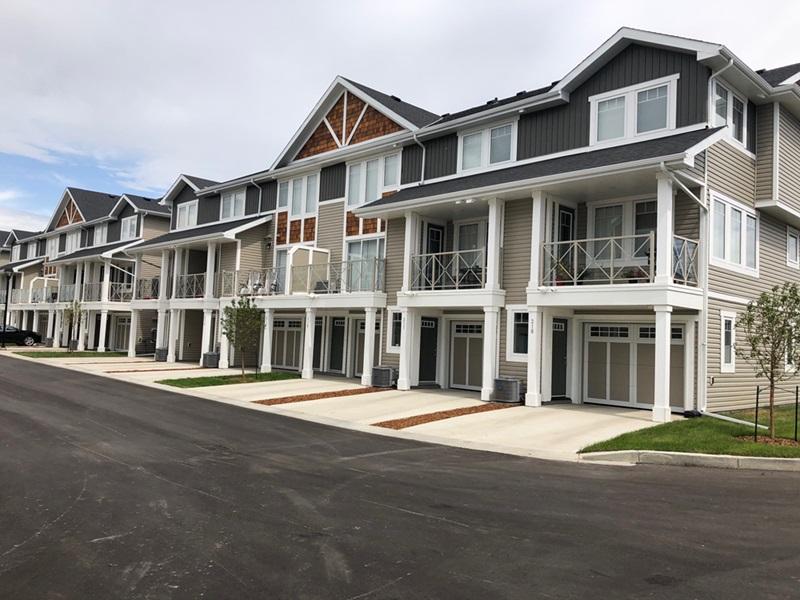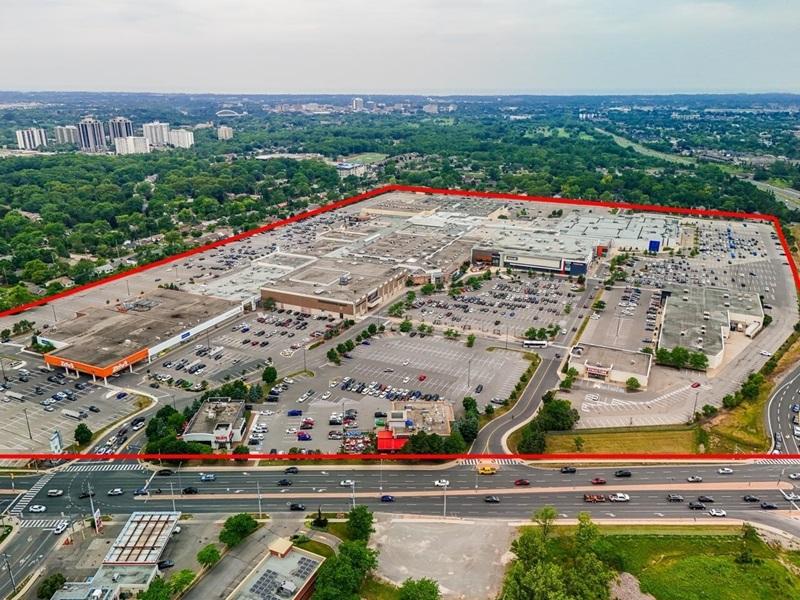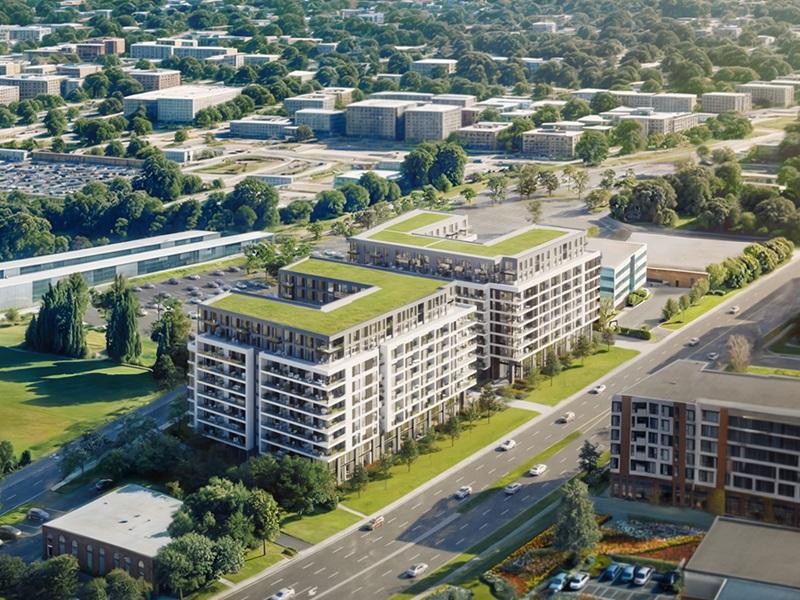
Michael J. Cooper is the president and chief responsible officer of Dream, as well as chair and CEO of Dream Office REIT. (Courtesy Dream)
Dream Hard Asset Alternatives Trust is narrowing its focus to investments which generate strong financial returns and provide positive social and environmental impacts, and will change its name to Dream Impact Trust on Oct. 26.
“We are very excited and proud to create the very first publicly traded local vehicle focused on impact investments,” said Dream Group of Companies founder, and Dream Hard Asset Alternatives Trust (DRA-UN-T) portfolio manager Michael Cooper during an Oct. 14 conference call.
“Impact investing is at a very early stage in its evolution, and we want to become part of defining and refining the industry.”
Dream Unlimited Corp. (DRM-T) has an ownership stake of more than 26 per cent in the trust and will remain its asset manager. Dream Unlimited has completed more than $36 billion in real estate and renewable power transactions, developed more than $4 billion worth of assets and has approximately $8 billion of assets under management.
Combined, Dream Unlimited and the trust’s current projects have a built-out value in excess of $6 billion. With $600 million of capital invested to date, the trust’s interest in these projects will be upwards of $2.3 billion upon completion.
The investments include affordable housing, energy-efficient and reduced carbon footprint buildings, and inclusive communities which focus on creating opportunities for under-supported groups and public spaces.
Dream Impact Trust investment criteria
Impact investing is done with the intention of generating a positive and measurable social and environmental impact, alongside a market return.
Impact investments account for about $19.8 billion in assets under management in Canada and grew at a 35 per cent compounded rate from 2016 to 2018, according to data provided by Dream.
The trust believes it’s well-positioned, with its existing assets and development pipeline, to deliver on its impact investment goals through attainable housing, inclusive communities and resource efficiency.
Investments will be made in mixed-income communities that are transit-oriented, located close to employment opportunities, and offer a substantively lower cost of living relative to the market.
Innovative real estate design can increase energy efficiency, reduce water use and waste, and cut carbon emissions to help achieve climate change commitments. The trust’s portfolio strategy will be anchored by the United Nations’ sustainable development goals.
“Addressing climate change through business will reward those companies that act quickly and decisively,” said Cooper.
“Making society more fair and providing access to basic places to live where people work, and creating a more inclusive society, are immediate and actionable necessities.”
The trust intends to outline ambitious impact investing targets, taking Canada’s desire to achieve net-zero emissions by 2050 into consideration, and is designed to both reduce residents’ cost of living and improve standards of living.
The trust will target annual returns of 10 to 13 per cent for income assets and development returns of 15 to 20 per cent. Its units have been trading at an approximately 40 per cent discount to net asset value, which represents an attractive entry point with strong growth potential.
Dream Impact Trust portfolio
The trust has full or partial ownership stakes in 24 residential, office, retail and commercial properties, primarily in the Greater Toronto Area and National Capital Region.
The portfolio is expected to be composed of 70 per cent income-producing properties, with the remainder under development.
It has more than 10,000 residential units and 3.5 million square feet of commercial gross leasable area in its development pipeline.
Zibi

An aerial image of recent construction progress at the Zibi development along the Ottawa River, straddling the cities of Ottawa and Gatineau. (Courtesy Zibi)
The trust owns a 20 per cent share of Zibi, a $1.6-billion, 34-acre mixed-use waterfront community that will eventually accommodate 6,000 workers and 5,000 residents in Gatineau and Ottawa. The trust has invested $120 million to provide roads and services, which has created 42 development sites.
Zibi will have approximately four million square feet of real estate, including approximately two million square feet of commercial space. There will be approximately 1,800 residential units, including about 400 affordable units.
Two condominiums have been completed and three office buildings have been retrofitted. A completely pre-leased office building and a 100 per cent affordable apartment on the Gatineau waterfront are being built now and should be producing income by the end of 2021.
Construction will start on two new office buildings and two new apartments within the next 12 months. The trust will continue to develop the site and add income properties over the next 10 years.
Zibi is expected to be one of the least environmentally impactful communities in North America. The Zibi Community Utility, in partnership with Hydro Ottawa, will provide net-zero carbon heating and cooling.
Zibi will include approximately eight acres dedicated to six public parks and six public plazas connected via walking trails and cycling networks. It will have access to multiple transit options, including Ottawa’s light rail system and Gatineau’s transit hub.
The trust has entered into a collaborative benefit agreement with the Algonquins of Pikwakanagan First Nation and the Algonquins of Ontario that’s focused on inclusive Indigenous engagement.
First Nations people will be involved at every stage of development, ensuring their culture and traditions are represented.
West Don Lands
The trust owns a 25 per cent share in West Don Lands, a LEED Gold purpose-built rental apartment community in downtown Toronto that will likely have 2,000 units upon completion. Thirty per cent will be rented at a 63 per cent discount to prevailing market rates during an affordability period of 99 years.
“We have a very strong incentive to ensure these buildings are maintained so that they’re functional and attractive to tenants,” said Jamie Cooper, the trust’s investments director.
“This will avoid the typical degradation of buildings that are run by the government that are 100 per cent affordable. The affordable tenants will enjoy high-quality accommodations throughout the building’s life cycle.”
The development was created through co-operation of the municipal, provincial and federal governments. Shoring and excavation are complete and the targeted completion date for the first three towers and 770 units is Q2 2023.
Canary Indigenous Hub
The trust is focused on increasing opportunities and promoting better outcomes for Indigenous communities.
It owns a 25 per cent stake in Canary Indigenous Hub, a one-of-a-kind mixed-use project in downtown Toronto’s Canary District being developed in partnership with Anishnawbe Health Toronto.
It will include a 13-storey, 206-unit condo, an 11-storey rental apartment, retail, and health, career and daycare centres.
All buildings have been designed with Indigenous architect consultation, will incorporate Indigenous design elements and be built to a LEED Gold standard.
Dream believes Canary Indigenous Hub will achieve a competitive return.
Brightwater
The trust has a 23.25 per cent interest in Brightwater, on a former Imperial Oil refinery property in Port Credit, in Mississauga. It’s being redeveloped into a 72-acre mixed-use waterfront community with approximately 3,000 residential units (including 150 affordable units) and 400,000 square feet of retail and commercial space.
The site was acquired in 2017 via a partnership involving Dream, Kilmer Group, DiamondCorp and FRAM + Slokker. It required significant remediation work, which is now complete. Vertical construction is to start in 2021.
Cooper said 310 market condo units were released a month ago and 75 per cent have been sold, while the remainder are under contract. He expects the return on the project to be at or above the market rate.
Brightwater won the 2020 BILD Pinnacle Award for Best New Community – Planned/Under Development.
Victory Soya Mills Silos
The trust acquired a 37.5 per cent ownership stake in a 5.3-acre lakeshore site at the foot of Parliament Street in downtown Toronto for $58 million in 2017. Cooper believes it’ll be worth $300 million if it achieves zoning approval for the proposed 1.2 million square feet of development and approximately 1,100 residential units.
Victory Soya Mills Silos were constructed during the Second World War to store commodities. Now a Heritage Property, the development proposal includes their preservation and incorporation into the project through either adaptive use or rehabilitation.
The property is currently being used as a respite centre that provides 100 beds for Toronto’s overwhelmed shelter system.
Other property updates
The trust is working toward BOMA BEST recertifications at its 10 Lower Spadina, 349 Carlaw Ave. and 49 Ontario St. properties in Toronto.
It owns all of 49 Ontario Street, a seven-storey, 87,105-square-foot office building on a 1.5-acre downtown site with 500,000 square feet of gross leasable area redevelopment potential. The trust is working to rezone the property to enhance its office component and add 400 purpose-built rental apartment units.
It’s also working towards a LEED Gold certification at Sussex Centre, the largest income property in the portfolio, of which it owns 50 per cent.
Sussex Centre, built at 50 Burnhamthorpe Rd. W. in Mississauga in 1989, was selected for one of Canada’s first green loans as a result of the sustainability initiatives to reduce its carbon footprint.











